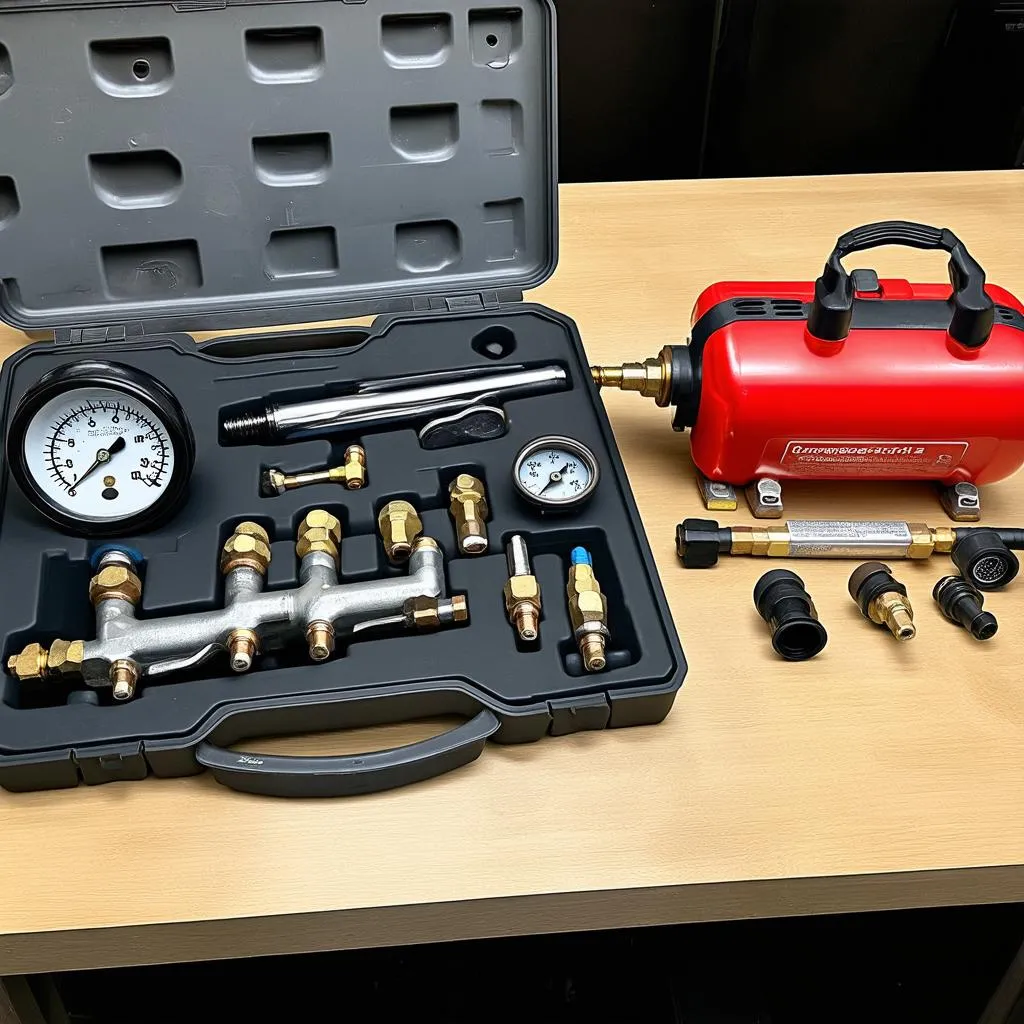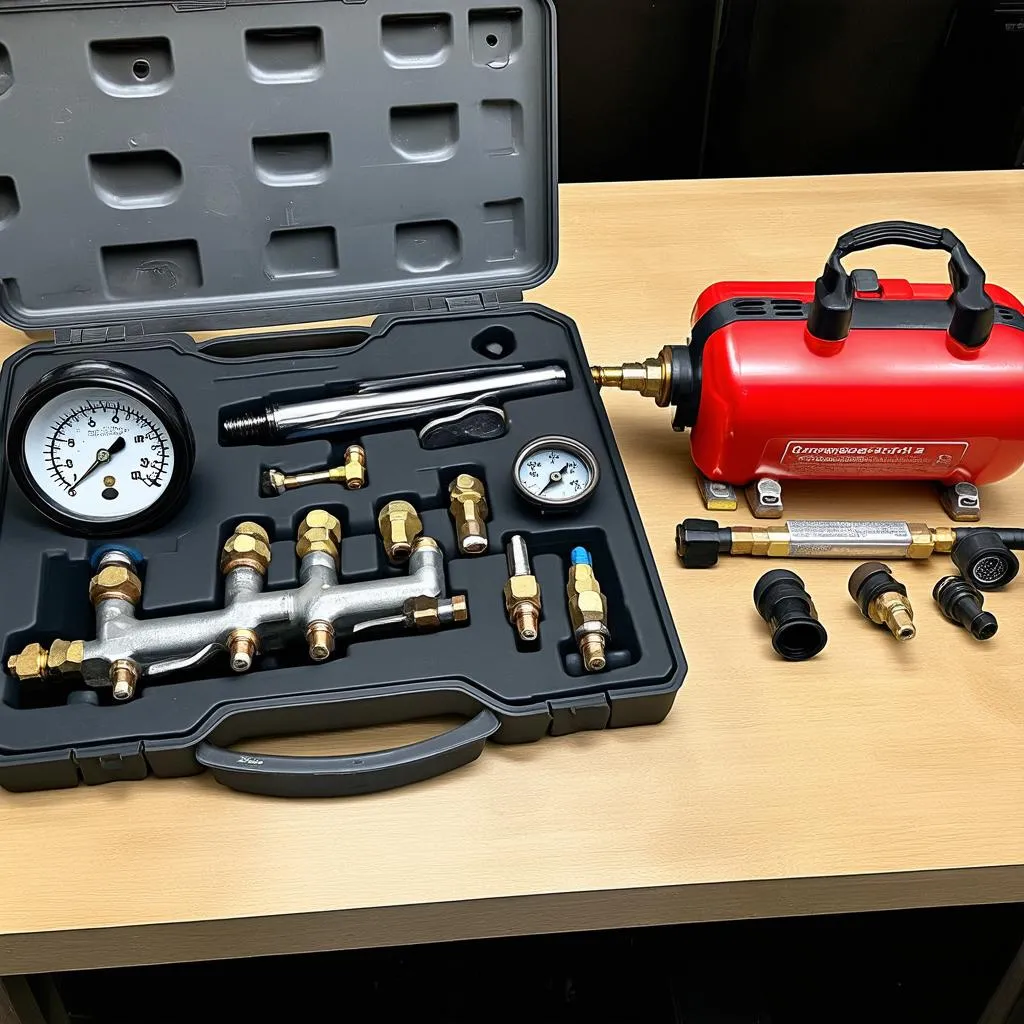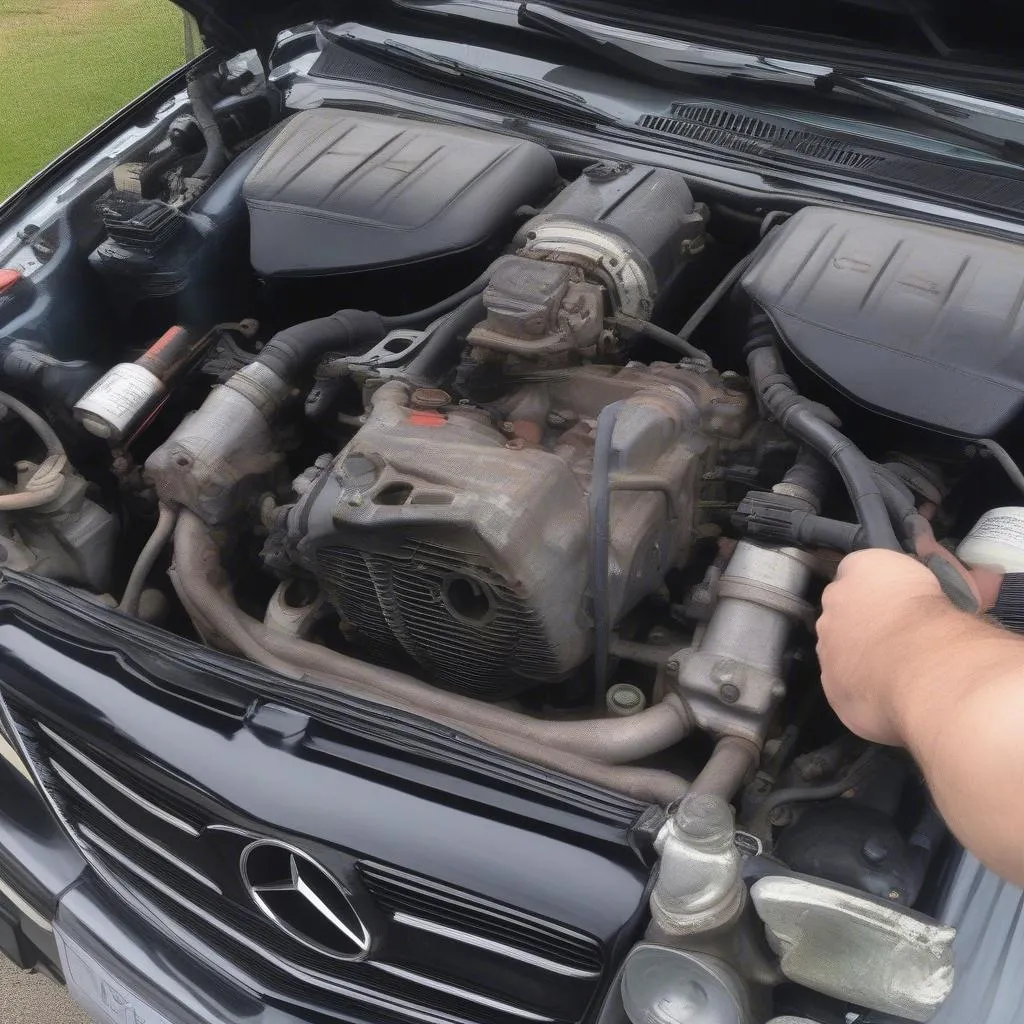A properly functioning AC system in your Mercedes is not just about comfort; it’s about ensuring a safe and enjoyable driving experience. Whether you’re a DIY enthusiast or a seasoned mechanic, having the right Mercedes AC tools is crucial for diagnostics, maintenance, and repairs. This comprehensive guide will delve into the world of Mercedes AC tools, equipping you with the knowledge to tackle any climate control challenge your car may throw your way.
Understanding Your Mercedes AC System
Before diving into the specifics of Mercedes AC tools, it’s important to have a basic understanding of how your car’s AC system works. Essentially, it’s a closed system that uses refrigerant to transfer heat away from the cabin. Key components include:
- Compressor: This component pressurizes and circulates the refrigerant.
- Condenser: Located at the front of the vehicle, the condenser cools the refrigerant, converting it from a gas to a high-pressure liquid.
- Evaporator: Positioned inside the dashboard, the evaporator receives the cold refrigerant, which absorbs heat from the cabin air blown over it.
- Expansion Valve: This valve regulates the flow of refrigerant into the evaporator.
Essential Mercedes AC Tools
Having the right tools is paramount for effectively diagnosing and repairing your Mercedes AC system. Here are some must-haves:
1. Refrigerant Leak Detector:
A refrigerant leak is a common culprit behind AC issues. A quality leak detector, either electronic or dye-based, will help you pinpoint the source of the leak.
2. Manifold Gauge Set:
This tool is your window into the AC system’s health. It allows you to measure the pressure of the refrigerant in both the high and low sides of the system, enabling you to diagnose issues like low refrigerant or a blocked expansion valve.
3. Vacuum Pump:
After servicing your AC system, it’s vital to remove air and moisture. A vacuum pump achieves this by creating a vacuum within the system, ensuring optimal performance and preventing contamination.
4. Refrigerant Recovery/Recycling/Recharge Machine:
This multifaceted machine is essential for safely handling refrigerant. It recovers refrigerant from the system, recycles it, and then allows you to recharge the system with the correct amount.
5. AC Hose Crimper:
If you need to replace AC hoses, an AC hose crimper is necessary for creating secure and leak-proof connections.
6. Mercedes-Specific Tools:
Beyond these general AC tools, some specialized tools cater specifically to Mercedes vehicles. These may include:
- Compressor Removal Tools
- Expansion Valve Core Remover and Installer
- Evaporator Core Remover and Installer
 Mercedes AC tools kit
Mercedes AC tools kit
Common Mercedes AC Problems and How to Diagnose Them
1. Weak or No Airflow:
- Possible Causes: A clogged cabin air filter, faulty blower motor resistor, or malfunctioning blower motor.
- Diagnostics: Inspect and replace the cabin air filter. Test the blower motor and resistor using a multimeter.
2. AC Not Blowing Cold Air:
- Possible Causes: Low refrigerant, faulty compressor, or a problem with the expansion valve.
- Diagnostics: Check the system for refrigerant leaks. Use a manifold gauge set to assess refrigerant pressure and compressor operation.
3. AC Making Noises:
- Possible Causes: A failing compressor, worn-out bearings, or loose components.
- Diagnostics: Listen carefully to the type and location of the noise to identify the potential source.
4. AC System Cycling On and Off Rapidly:
- Possible Causes: Low refrigerant, a blockage in the system, or a faulty pressure switch.
- Diagnostics: Check refrigerant levels and inspect for blockages. Test the pressure switch using a multimeter.
FAQs about Mercedes AC Tools
1. Can I use generic AC tools on my Mercedes?
While some generic tools can be used, investing in Mercedes-specific tools is highly recommended, especially for complex procedures. These tools are designed to interface perfectly with your car’s components, minimizing the risk of damage.
2. How often should I service my Mercedes AC system?
It’s generally recommended to have your Mercedes AC system serviced every 2 years or 24,000 miles. However, if you notice any issues or suspect a leak, don’t hesitate to have it checked sooner.
3. Is it safe to recharge my Mercedes AC system myself?
While DIY recharge kits are available, it’s best to leave refrigerant handling to certified professionals. Refrigerant is a hazardous substance, and improper handling can be harmful to you and the environment.
 Mechanic working on Mercedes AC system
Mechanic working on Mercedes AC system
Conclusion
Maintaining the peak performance of your Mercedes AC system is essential for a comfortable and enjoyable driving experience. By understanding the key components, common problems, and essential tools, you can confidently tackle diagnostics and repairs.
If you’re looking for high-quality Mercedes AC tools and other diagnostic equipment, CARDIAGTECH offers a wide range of professional-grade products to meet your needs. Check out their website for more information on Mercedes-specific tools and other automotive diagnostic solutions.



